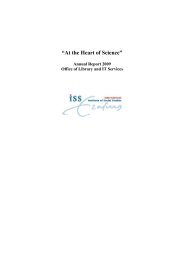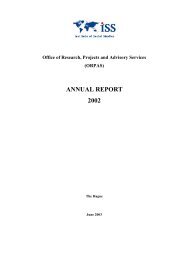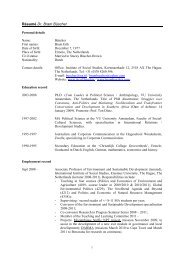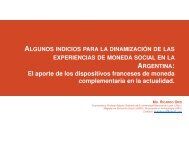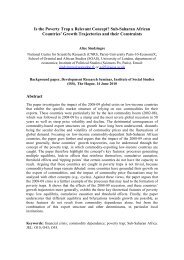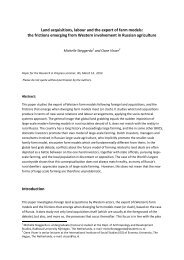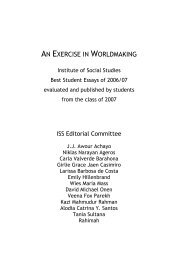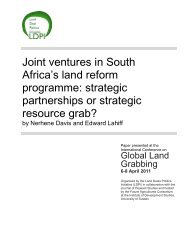AN EXERCISE IN WORLDMAKING 2009 - ISS
AN EXERCISE IN WORLDMAKING 2009 - ISS
AN EXERCISE IN WORLDMAKING 2009 - ISS
You also want an ePaper? Increase the reach of your titles
YUMPU automatically turns print PDFs into web optimized ePapers that Google loves.
82 SABR<strong>IN</strong>A BR<strong>AN</strong>DT<br />
improved productive capacity will reduce the imports of construction material<br />
and boost export growth to 15% per year on average. This will ease<br />
the pressure on the current account. (GoR 2007: 129)<br />
Finally, Gore’s notion on strategic integration into regional markets<br />
can also be found in the EDPRSP. Progress on regional integration is<br />
mentioned (for example, Rwanda has joined the East African Community)<br />
and it aims to turn its weakness, being landlocked, into a strength -<br />
a regional hub.<br />
Besides the PRSPs, which are medium-term oriented, the GoR has<br />
also published a long term development strategy, Rwanda Vision 2020 in<br />
2000. The content of this document is even closer related to the Latent<br />
South Consensus – be it already for the fact that its orientation is longterm.<br />
The final sentence of this document gives us a last confirmation of<br />
some similarities between the Southern Consensus and Rwanda’s development<br />
strategy:<br />
[T]here is a need to devise and implement policies as well as mobilize resources<br />
to bring about the necessary transformation to achieve the Vision.<br />
This is realistic based on the fact that countries with similar unfavourable<br />
conditions have succeeded. The development experience of the East Asian<br />
“Tigers” proves that this dream could be a reality. (GoR 2000: 25)<br />
6 CONCLUSION<br />
In the 1990s, critiques on the achievements of neoliberal development<br />
policies led to a debate on aid effectiveness and poverty reduction. This<br />
has introduced us to the Poverty Reduction Strategy of the IFIs and the<br />
five principles of aid effectiveness of the Paris Declaration. Though announced<br />
as a “paradigm shift”, these mechanisms have been criticised<br />
for being mere morphed versions of the neoliberal policies of the past.<br />
The principle of ownership more specifically has been challenged because<br />
it is undermined by the conditionalities and IFIs interference in the<br />
process of drawing the PRSP. Therefore the PRSP offers no room for<br />
alternative policies and resemble the neoliberal policy package favoured<br />
by the Washington Consensus.<br />
This essay contributes to this debate by examining the content of the<br />
EDPRSP 2008-2012 of Rwanda. It finds that indeed some neoliberal<br />
oriented policies are found in the document, and the IFIs did interfere in



